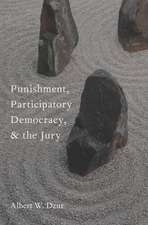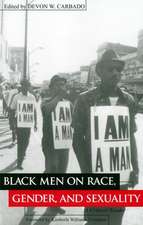Criminal Law: A Comparative Approach
Autor Markus Dubber, Tatjana Hörnleen Limba Engleză Paperback – 4 aug 2016
| Toate formatele și edițiile | Preț | Express |
|---|---|---|
| Paperback (1) | 419.92 lei 31-38 zile | |
| OUP OXFORD – 4 aug 2016 | 419.92 lei 31-38 zile | |
| Hardback (1) | 1140.17 lei 31-38 zile | |
| OUP OXFORD – 27 mar 2014 | 1140.17 lei 31-38 zile |
Preț: 419.92 lei
Preț vechi: 477.46 lei
-12% Nou
Puncte Express: 630
Preț estimativ în valută:
80.35€ • 85.92$ • 66.100£
80.35€ • 85.92$ • 66.100£
Carte tipărită la comandă
Livrare economică 07-14 aprilie
Preluare comenzi: 021 569.72.76
Specificații
ISBN-13: 9780198794226
ISBN-10: 0198794223
Pagini: 720
Dimensiuni: 173 x 246 x 37 mm
Greutate: 1.18 kg
Editura: OUP OXFORD
Colecția OUP Oxford
Locul publicării:Oxford, United Kingdom
ISBN-10: 0198794223
Pagini: 720
Dimensiuni: 173 x 246 x 37 mm
Greutate: 1.18 kg
Editura: OUP OXFORD
Colecția OUP Oxford
Locul publicării:Oxford, United Kingdom
Recenzii
Dubbers and Hörnle's book is unique in its approach; Criminal Law: A Comparative Approach looks behind the scenes of two of the most influential criminal law systems. It provides a highly instructive account of their conceptual foundations and offers an illuminating juxtaposition and analysis of their specific approaches towards a vast array of modern-day criminal laws most important subjects. In so doing, the authors not only foster mutual understanding, but also surprise their readers with numerous insights into the inner workings of their own legal systems.
Criminal Law: A Comparative Approach is an unparalleled resource for all scholars of the criminal law. Bringing together a wealth of material in one volume, it facilitates fine grained analysis of the peculiarities of domestic criminal law from a comparative perspective. As such, it is an irresistible invitation to escape the customary jurisdictional silos of criminal law scholarship.
German and United States law have long been the competing lodestars of criminal justice. Drawing upon well-annotated cases and statutes, Dubbers and Hörnles Criminal Law: A Comparative Approach provides an indispensable cartography of both legal systems and especially their points of departure. It is hard to imagine how we previously operated without such a well-plotted map of comparative criminal law.
For the first time, the wealth of German legal thinking in criminal law has been made accessible to English-speaking jurists. Two leading experts of comparative legal thinking present the great cases of German and U.S. criminal law and masterfully analyze their meaning and impact. Anyone interested in criminal law will vastly profit from the novel perspectives that this volume offers.
Dubber and Hörnle have teamed up to produce a richly stimulating volume, one that doubles as an innovative teaching tool and a valuable reference work on comparative criminal law. By comparing American and German law to each other, the authors reveal much about the underlying structure of criminal law that readers might miss by looking at either system on its own.
Dubber and Hörnle Criminal Law is a pioneering piece of comparative law scholarship. Avoiding the kaleidoscope of multiple systems description, this innovative book offers a profound and detailed analysis of two major criminal law traditions: the US and the German one. Taking so seriously the comparative approach, Dubber and Hörnle allow the reader to understand not only the essential features of the examined systems, but also the very nature of fundamental principles, doctrines, and critical decisions that shape the criminal law almost everywhere today.
Criminal Law: A Comparative Approach is an unparalleled resource for all scholars of the criminal law. Bringing together a wealth of material in one volume, it facilitates fine grained analysis of the peculiarities of domestic criminal law from a comparative perspective. As such, it is an irresistible invitation to escape the customary jurisdictional silos of criminal law scholarship.
German and United States law have long been the competing lodestars of criminal justice. Drawing upon well-annotated cases and statutes, Dubbers and Hörnles Criminal Law: A Comparative Approach provides an indispensable cartography of both legal systems and especially their points of departure. It is hard to imagine how we previously operated without such a well-plotted map of comparative criminal law.
For the first time, the wealth of German legal thinking in criminal law has been made accessible to English-speaking jurists. Two leading experts of comparative legal thinking present the great cases of German and U.S. criminal law and masterfully analyze their meaning and impact. Anyone interested in criminal law will vastly profit from the novel perspectives that this volume offers.
Dubber and Hörnle have teamed up to produce a richly stimulating volume, one that doubles as an innovative teaching tool and a valuable reference work on comparative criminal law. By comparing American and German law to each other, the authors reveal much about the underlying structure of criminal law that readers might miss by looking at either system on its own.
Dubber and Hörnle Criminal Law is a pioneering piece of comparative law scholarship. Avoiding the kaleidoscope of multiple systems description, this innovative book offers a profound and detailed analysis of two major criminal law traditions: the US and the German one. Taking so seriously the comparative approach, Dubber and Hörnle allow the reader to understand not only the essential features of the examined systems, but also the very nature of fundamental principles, doctrines, and critical decisions that shape the criminal law almost everywhere today.
Notă biografică
Markus D. Dubber is Professor of Law at the University of Toronto. Dubber's scholarship has focused on theoretical, comparative, and historical aspects of criminal law. His publications include Handbook of Comparative Criminal Law, Modern Histories of Crime and Punishment, The New Police Science: The Police Power in Domestic and International Governance, The Police Power: Patriarchy and the Foundations of American Government, Einführung in das US-amerikanische Strafrecht, Criminal Law: Model Penal Code, and Victims in the War on Crime: The Use and Abuse of Victims' Rights.Tatjana Hörnle is Professor of Criminal Law, Comparative Criminal Law, and Penal Philosophy, Humboldt University Berlin. She writes mainly about substantive criminal law and sentencing and about the foundations of the criminal law in moral and political philosophy and constitutional law. In addition to numerous articles in German and international law journals, Professor Hörnle has published on proportionality in sentencing, on offensive conduct, on punishment theories and on freedom of will and culpability.











